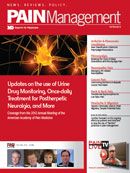Second-guessing Physicians Does Not Improve Safety
Publisher's note, March 2012.
Due to concerns that Medicare Advantage and Medicare Part D sponsors are not implementing sufficient drug utilization review (DUR) and drug utilization monitoring practices, leading to the potential overutilization of opioid pain medications (especially oxycodone and hydrocodone) by patients, the Centers for Medicare and Medicaid Services (CMS) recently announced that, effective January 13, 2013, sponsors would be expected to tighten their review practices and implement safety protocols designed to protect beneficiaries from inappropriate overutilization of pain medications and other drugs.
The CMS stated that “if point of sale (POS) safety edits, such as ‘therapeutic duplication,’ ‘maximum dose exceeded,’ ‘refill too soon,’ or quantity limits (QLs) were appropriately implemented, such egregious overutilization can be averted” (http://go.cms.gov/GQ8IFZ). While all responsible pain management stakeholders support efforts to promote responsible prescribing and dispensing practices and to curb the abuse, misuse, and diversion of opioid medications, this latest effort by the federal government to monitor certain aspects of the practice of pain management may endanger patients’ access to medically necessary treatments while further encroaching on the physician-patient relationship.
One key section of the CMS document explains that the desired outcome of this renewed scrutiny on prescribing and dispensing controlled substances for pain is to empower the Medicare plans themselves to intercede in the clinical decision making process by enabling them to deny patients access to the medications prescribed by their physicians. CMS claims that “prescribers are currently non-responsive to retrospective DUR requests, and that this non-responsiveness and the sponsors’ lack of authority over providers [reduces] the impact of overutilization review activities.” Thus the document states that “in the event that a beneficiary’s prescription drug claims for opioid analgesics cannot be established as medically necessary to the plan’s satisfaction, the sponsor may implement beneficiary-level edits at POS at all pharmacies that result in the rejection of claims, or rejection of quantities in excess of plan established limits of opioid analgesics, for the beneficiary.”
Further empowering payers to decide what constitutes a “medically necessary” treatment and then, when a physician’s treatment decision is found to be unacceptable, to summarily deny medications to patients continues a dangerous trend that has seen the federal government increasingly in favor of substituting bureaucratic control for the considered judgment and expertise of treating physicians.
Fortunately, physicians are beginning to recognize these top-down pronouncements for what they are and are pushing back. Even the AMA thinks this latest decision by CMS goes too far. James Madara, MD, AMA executive vice president and CEO, sent a letter to the CMS in which he stated that this CMS plan could “ weaken beneficiary protections and create significant access barriers to clinically indicated drugs for some of the most vulnerable patients and potentially undermine quality patient outcomes as well as the physician-patient relationship” (http://bit.ly/GMnZWr). Madara also took issue with the CMS claim that Medicare plan sponsors are “in a unique position to evaluate medication overutilization.” He responded that Medicare plan sponsors are in fact “not in a position to evaluate medication overutilization. The only information they have is the various claims that are submitted for prescription coverage. Sponsors do not know diagnoses and they do not know about any other services the patient is receiving.” Madara called on CMS to “acknowledge that physicians are best equipped to evaluate the medication needs of their patients” and avoid policies that “substitute physician clinical judgment with that of sponsors.”
Physicians have been asked to shoulder much of the burden of identifying patients at risk for opioid abuse, misuse, and diversion, all while coming under increased scrutiny themselves when prescribing these medications. Now CMS proposes to remove physicians from the picture altogether in some cases, reserving the right to approve or deny pain medications. Promoting responsible opioid prescribing and preventing misuse and abuse requires the cooperation and participation of all stakeholders. Second-guessing physicians’ clinical judgment and overruling the decisions made by patients and their doctors will only undermine that alliance.
